英语中everything的用法及语法特点
中考语法-复合不定代词的用法特点
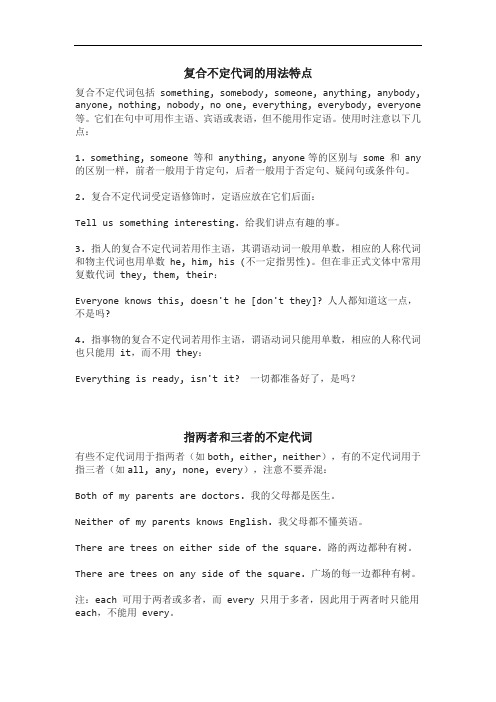
复合不定代词的用法特点复合不定代词包括 something, somebody, someone, anything, anybody, anyone, nothing, nobody, no one, everything, everybody, everyone 等。
它们在句中可用作主语、宾语或表语,但不能用作定语。
使用时注意以下几点:1. something, someone 等和 anything, anyone等的区别与 some 和 any 的区别一样,前者一般用于肯定句,后者一般用于否定句、疑问句或条件句。
2. 复合不定代词受定语修饰时,定语应放在它们后面:Tell us something interesting. 给我们讲点有趣的事。
3. 指人的复合不定代词若用作主语,其谓语动词一般用单数,相应的人称代词和物主代词也用单数 he, him, his (不一定指男性)。
但在非正式文体中常用复数代词 they, them, their:Everyone knows this, doesn't he [don't they]? 人人都知道这一点,不是吗?4. 指事物的复合不定代词若用作主语,谓语动词只能用单数,相应的人称代词也只能用 it,而不用 they:Everything is ready, isn't it? 一切都准备好了,是吗?指两者和三者的不定代词有些不定代词用于指两者(如both, either, neither),有的不定代词用于指三者(如all, any, none, every),注意不要弄混:Both of my parents are doctors. 我的父母都是医生。
Neither of my parents knows English. 我父母都不懂英语。
There are trees on either side of the square. 路的两边都种有树。
everything用法
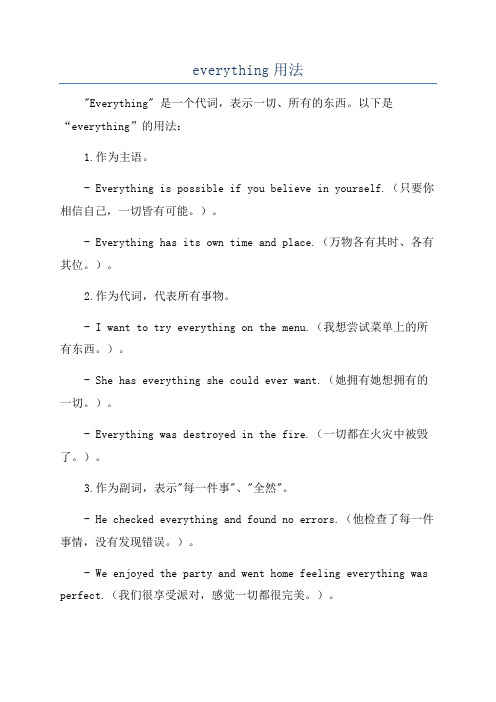
everything用法"Everything" 是一个代词,表示一切、所有的东西。
以下是“everything”的用法:1.作为主语。
- Everything is possible if you believe in yourself.(只要你相信自己,一切皆有可能。
)。
- Everything has its own time and place.(万物各有其时、各有其位。
)。
2.作为代词,代表所有事物。
- I want to try everything on the menu.(我想尝试菜单上的所有东西。
)。
- She has everything she could ever want.(她拥有她想拥有的一切。
)。
- Everything was destroyed in the fire.(一切都在火灾中被毁了。
)。
3.作为副词,表示"每一件事"、"全然"。
- He checked everything and found no errors.(他检查了每一件事情,没有发现错误。
)。
- We enjoyed the party and went home feeling everything was perfect.(我们很享受派对,感觉一切都很完美。
)。
- She loves him with everything she has.(她用全部的爱去爱他。
)。
总之,“everything” 是一个广泛使用的单词,可以用来表示“所有的”,或者是“每个事物”。
中考英语不定代词用法及练习
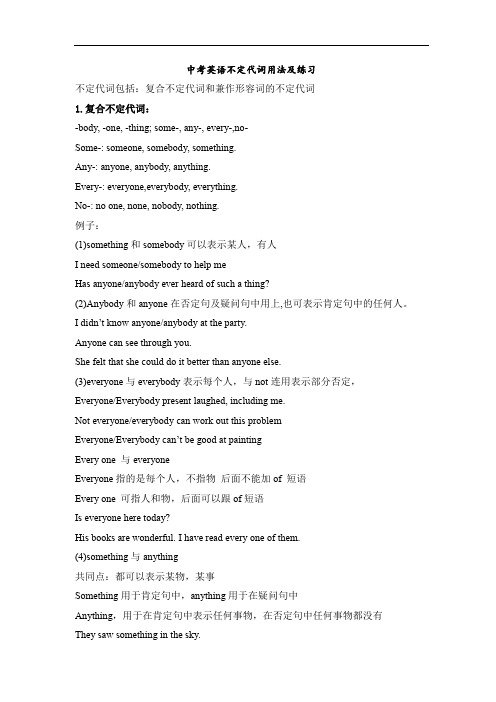
中考英语不定代词用法及练习不定代词包括:复合不定代词和兼作形容词的不定代词1.复合不定代词:-body, -one, -thing; some-, any-, every-,no-Some-: someone, somebody, something.Any-: anyone, anybody, anything.Every-: everyone,everybody, everything.No-: no one, none, nobody, nothing.例子:(1)something和somebody可以表示某人,有人I need someone/somebody to help meHas anyone/anybody ever heard of such a thing?(2)Anybody和anyone在否定句及疑问句中用上,也可表示肯定句中的任何人。
I didn’t know anyone/anybody at the party.Anyone can see through you.She felt that she could do it better than anyone else.(3)everyone与everybody表示每个人,与not连用表示部分否定,Everyone/Everybody present laughed, including me.Not everyone/everybody can work out this problemEveryone/Everybody can’t be good at paintingEvery one 与everyoneEveryone指的是每个人,不指物后面不能加of 短语Every one 可指人和物,后面可以跟of短语Is everyone here today?His books are wonderful. I have read every one of them.(4)something与anything共同点:都可以表示某物,某事Something用于肯定句中,anything用于在疑问句中Anything,用于在肯定句中表示任何事物,在否定句中任何事物都没有They saw something in the sky.Is there anything special you want to do or see in Bejing?You can buy anything you wantSo I don’t eat anything that’s been cooked in oil.(5)everything 与nothingPeter loves dreaming about everythig.Alice had nothing to do.PS:不定代词后面加形容词:Do you have anything interesting to tell us?I have nothing important to deal with now.(6)nodody 与no oneNobody/ No one knows the secretI have no one/nobody to talk to.PS:Somebody 与nobody作名词表示:是个人物,无名小卒,小人物I was nothing and nobody with everything to prove.He is somedody in the city.all, another, any, both, each, either, few, little, many, much, neither, other, some.2兼作形容词的不定代词;(1)Some 与anySome修饰可数名词复数与不可数名词,表示一些,在肯定句中Any在于否定句,疑问句和条件句之中。
英语八年级上册知识讲义 不定代词(Units 1-2语法归纳)-人教新目标版
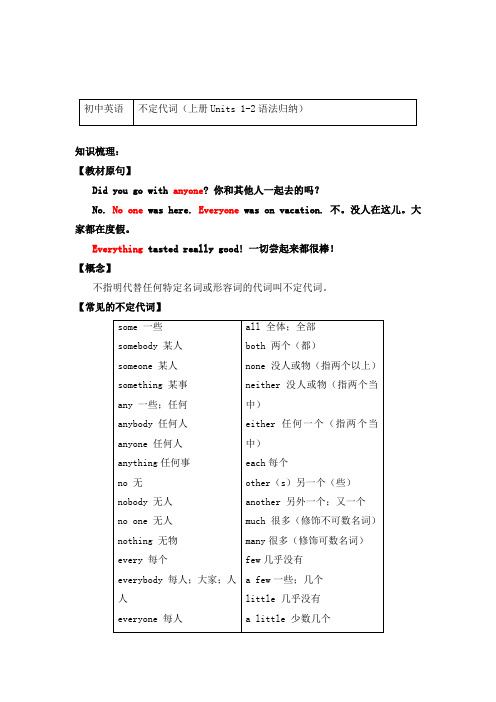
知识梳理:【教材原句】Did you go with anyone? 你和其他人一起去的吗?No. No one was here. Everyone was on vacation. 不。
没人在这儿。
大家都在度假。
Everything tasted really good! 一切尝起来都很棒!【概念】不指明代替任何特定名词或形容词的代词叫不定代词。
【常见的不定代词】everything 每件事;一切1. some系列的词主要用于肯定句中;any系列的词主要用于疑问句、否定句中。
它们都既可修饰可数名词,也可修饰不可数名词。
【例句】There is something wrong with her. 她生病了。
There isn’t anyone in the classroom. 教室里没有人。
提示:在Would you like sth.?一类的问句中用some,不用any。
2. 由some, any, no, every构成的复合不定代词作主语时,谓语动词用第三人称单数形式。
【例句】Everyone in China likes the Spring Festival. 在中国,人人都喜欢春节。
3. 形容词修饰不定代词时,通常放在不定代词的后面。
【例句】Please do something special. 请做些特别的事情吧。
4. 几组不定代词的区别:① both, either, neither这三个词都指两者,both表示“两者都”,either表示“两者中的任何一个”,neither表示“两者都不”。
【例句】—Which do you like better, tea or coffee? 你更喜欢哪个,茶还是咖啡?—Neither, I like water better. 两者都不,我更喜欢水。
② a few; few;a little; little★ a few, few用来修饰可数名词,a little, little用来修饰不可数名词。
英语定语从句语法解析

英语定语从句语法解析语语法是针对英语语言进行研究后,系统地总结归纳出来的一系列语言规则。
英语语法的精髓在于掌握语言的使用。
下面店铺带来英语定语从句语法解析,欢迎阅读!英语定语从句语法解析篇11.先行词为all, anything, something, nothing, everything, much, little, none等不定代词时,关系代词一般只用that,不用which。
在大多数情况下that可以省略.Please tell me everything you know about the matter.Thats all we can do at the moment.2.as引出的限制性定语从句在such as的结构中as可作关系代词,引出限制性定语从句。
有时和same连用,在从句中可作主语、宾语或表语等。
Such people as were recommended by him were reliable.Ive never seen such a talented young man as he is.I have the same trouble as you .3.as引出的非限制性定语从句as可作关系代词引出非限制性定语从句,代替整个主句,通常译为(正)如一样,(正)象一样等。
as引导的从句一般用逗号与主句隔开,可以位于主句的前面、中间或后面.I live a long way from work, as you know.She did not, as her friend had feared, break down.As is generally accepted, economic growth is determined by the smooth development of production.4.分隔式定语从句定语从句一般紧跟在先行词之后,但有时会被其他句子成分与先行词隔开,从而构成分隔式定语从句。
新概念英语第二册Lesson38Everythingexpecttheweather(课文详解练习)

新概念英语第二册Lesson 38Everything except the weather唯独没有考虑到天气My old friend, Harrison, had lived in the Mediterranean for many years before he returned to England. He had often dreamed of retiring in England and had planned to settle down in the country. He had no sooner returned than he bought a house and went to live there. Almost immediately he began to complain about the weather, for even though it was still summer, it rained continually and it was often bitterly cold. After so many years of sunshine, Harrison got a shock. He acted as if he had never lived in England before. In the end, it was more than he could bear. He had hardly had time to settle down when he sold the house and left the country. The dream he had had for so many years ended there. Harrison had thought of【课文翻译】My old friend, Harrison, had lived in the Mediterranean for many years before he returned to England. 我的老朋友哈里森在回到英国以前曾多年居住在地中海地区。
初中英语定语从句知识点:关系代词的用法
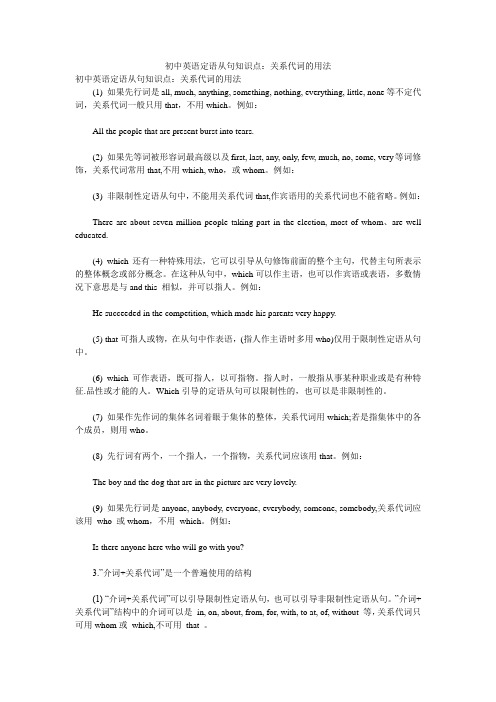
初中英语定语从句知识点:关系代词的用法初中英语定语从句知识点:关系代词的用法(1) 如果先行词是all, much, anything, something, nothing, everything, little, none等不定代词,关系代词一般只用that,不用which。
例如:All the people that are present burst into tears.(2) 如果先等词被形容词最高级以及first, last, any, only, few, mush, no, some, very等词修饰,关系代词常用that,不用which, who,或whom。
例如:(3) 非限制性定语从句中,不能用关系代词that,作宾语用的关系代词也不能省略。
例如:There are about seven million people taking part in the election, most of whom、are well educated.(4) which还有一种特殊用法,它可以引导从句修饰前面的整个主句,代替主句所表示的整体概念或部分概念。
在这种从句中,which可以作主语,也可以作宾语或表语,多数情况下意思是与and this 相似,并可以指人。
例如:He succeeded in the competition, which made his parents very happy.(5) that可指人或物,在从句中作表语,(指人作主语时多用who)仅用于限制性定语从句中。
(6) which可作表语,既可指人,以可指物。
指人时,一般指从事某种职业或是有种特征.品性或才能的人。
Which引导的定语从句可以限制性的,也可以是非限制性的。
(7) 如果作先作词的集体名词着眼于集体的整体,关系代词用which;若是指集体中的各个成员,则用who。
(8) 先行词有两个,一个指人,一个指物,关系代词应该用that。
英语中的主谓一致指的是谓语动词在人称和数上必须与主语保持一致
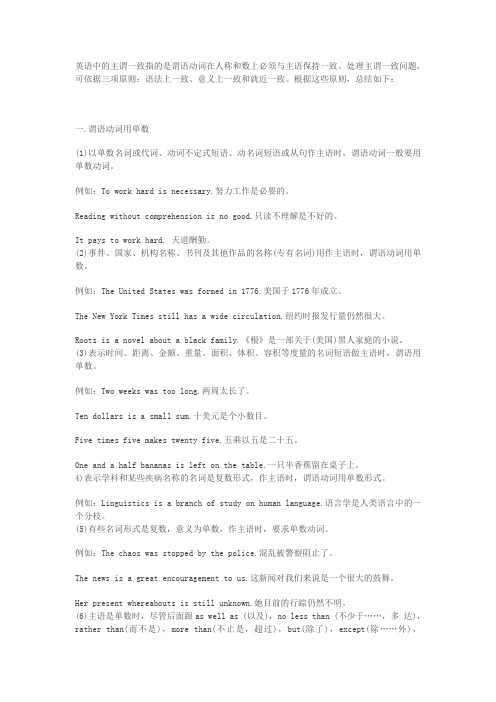
英语中的主谓一致指的是谓语动词在人称和数上必须与主语保持一致。
处理主谓一致问题,可依据三项原则:语法上一致、意义上一致和就近一致。
根据这些原则,总结如下:一.谓语动词用单数(1)以单数名词或代词、动词不定式短语、动名词短语或从句作主语时,谓语动词一般要用单数动词。
例如:To work hard is necessary.努力工作是必要的。
Reading without comprehension is no good.只读不理解是不好的。
It pays to work hard. 天道酬勤。
(2)事件、国家、机构名称、书刊及其他作品的名称(专有名词)用作主语时,谓语动词用单数。
例如:The United States was formed in 1776.美国于1776年成立。
The New York Times still has a wide circulation.纽约时报发行量仍然很大。
Roots is a novel about a black family.《根》是一部关于(美国)黑人家庭的小说。
(3)表示时间、距离、金额、重量、面积、体积、容积等度量的名词短语做主语时,谓语用单数。
例如:Two weeks was too long.两周太长了。
Ten dollars is a small sum.十美元是个小数目。
Five times five makes twenty five.五乘以五是二十五。
One and a half bananas is left on the table.一只半香蕉留在桌子上。
4)表示学科和某些疾病名称的名词是复数形式,作主语时,谓语动词用单数形式。
例如:Linguistics is a branch of study on human language.语言学是人类语言中的一个分枝。
(5)有些名词形式是复数,意义为单数,作主语时,要求单数动词。
例如:The chaos was stopped by the police.混乱被警察阻止了。
- 1、下载文档前请自行甄别文档内容的完整性,平台不提供额外的编辑、内容补充、找答案等附加服务。
- 2、"仅部分预览"的文档,不可在线预览部分如存在完整性等问题,可反馈申请退款(可完整预览的文档不适用该条件!)。
- 3、如文档侵犯您的权益,请联系客服反馈,我们会尽快为您处理(人工客服工作时间:9:00-18:30)。
英语中everything的用法及语法特点
1. 用作主语,谓语用单数;使用代词时,用 it。
如:
Everything is ready, isn't it? 一切都准备好了,是吗?
2. 与 not 连用,通常构成部分否定。
如:
Money isn't everything, is it? 金钱不是万能的,对吧?
3. 受形容词修饰时,形容词应后置。
如:
There is everything wrong with this place. 这个地方全不对头了。
Everything useful should be kept. 每一件有用的东西都应该保存好。
4. 后接定语从句时,通常用关系代词that来引导(that作宾语时通常省略)。
如:
Have you everything that you need? 你需要的东西都有了吗?
I could understand everything (that) she said. 她说的事情,我都明白。
偶尔也可见到用which代替that在everything后引导定语从句,但是很少,学生宜慎用。
